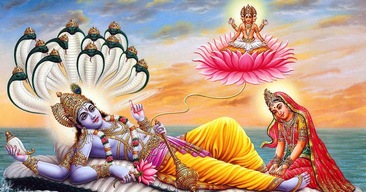|
BY ASHLEY KLINE [email protected]  Brahma prays to Vishnu, his creator, prior to creation. Brahma prays to Vishnu, his creator, prior to creation. Doubt in God’s existence, and therefore God’s presence, is a common struggle experienced by believers and non-believers alike. Recently, I realized a truth I once refused to confess: I too had doubt. Since coming to faith, I have constantly struggled to see God’s presence due to doubts regarding His existence. Were the selfless acts of those who surrounded me in the body of Christ really a reflection of God’s presence within them, or was I seeing no more than the influence of faith in God? Were these acts simply a result of mind over matter? When looking at early church martyrs, is it possible that their faith in God alone equipped them to choose death as opposed to the pres- ence of God himself? Having a psychology degree, I believed in the infinite power and capacity of the human mind. How- ever, I did not fully believe in the presence of God. This pre- vented me from being able to recognize so many examples of God’s existence and presence. A few weeks ago over lunch, a good friend of mine spoke a beautiful word into this doubt: our God is beyond human con- ception and understanding. If our God is unable to be con- ceived, how is it we can have faith in Him in the first place? When looking at other religions, it becomes clear that what we see are gods crafted by human hands. For example, it is typical for other gods to have origin sto- ries. In Hinduism, some state that the creator god, Brahma, one of the main gods along with Vishnu and Shiva, was born from an egg. Others have him originating from Vishnu’s naval. In either case, there is an explanation of where he came from. In contrast, our God is said to be eternal, having neither beginning nor end. The origins of the Judeo-Christian God are un- known and unexplained, going against our human inclination to have as thorough answers as possible regarding our origins (Psalm 90:2 – “From everlasting to everlasting you are God”). Additionally, many gods from other religions possess very human characteristics. When assessing many indigenous reli- gions, those practiced by smaller native communities, we tend to see trickster gods. Tricksters are those characterized by deception and fraudulence, both very human. On the other hand, the trinitarian Judeo-Christian God pos- sesses characteristics counter to our human inclinations. Therefore, such characteristics would be difficult for the hu- man mind to construe. For example, consider how our God abolishes the principle of “an eye for an eye, a tooth for a tooth” and moves us from this principle to the completely counterintuitive “Love your enemies!” Ultimately, I hope this brief blog post can help you through any personal doubts, or at least equip you to help those in your life experiencing doubt. Doubt need not equal the abolishment of faith but is oftentimes a critical part of the faith journey. There is little doubt that doubt is widely experienced and therefore should be more widely discussed in the church (Mark 9:24 - “Lord, I believe; help my unbelief”). https://www.britannica.com/topic/Brahma-Hindu-god
0 Comments
Leave a Reply. |
|